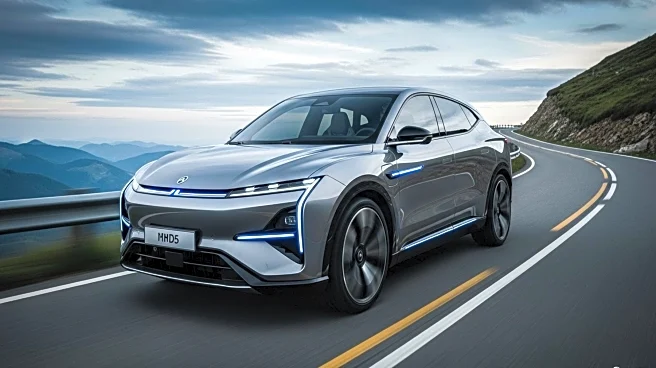What is the story about?
What's Happening?
Automakers are increasingly offering high-performance electric SUVs that combine practicality with sporty performance. The Ford Mustang Mach-E GT, Chevrolet Blazer EV SS, Kia EV6 GT, and Hyundai Ioniq 5 N are among the models providing thrilling acceleration and enhanced handling. These vehicles feature powerful electric powertrains, adaptive suspensions, and sportier aesthetics. The Ford Mustang Mach-E GT, for instance, delivers 480 horsepower and can accelerate from zero to 60 mph in 3.7 seconds. Similarly, the Chevrolet Blazer EV SS offers up to 615 horsepower and a 3.4-second 0-60 mph time. Kia's EV6 GT and Hyundai's Ioniq 5 N both boast 641 horsepower and a 3.3-second sprint to 60 mph. These models are designed to offer a dynamic driving experience while maintaining the benefits of electric vehicles, such as reduced emissions and lower operating costs.
Why It's Important?
The introduction of high-performance electric SUVs marks a significant shift in the automotive industry, as manufacturers respond to consumer demand for vehicles that offer both practicality and excitement. This trend reflects the growing acceptance of electric vehicles as viable alternatives to traditional gas-powered cars, particularly in the performance segment. By offering models that deliver thrilling acceleration and handling, automakers are expanding the appeal of electric vehicles to a broader audience, including those who prioritize driving dynamics. This development could accelerate the transition to electric mobility, reducing reliance on fossil fuels and contributing to environmental sustainability. Additionally, the competitive pricing of these models may make high-performance electric vehicles more accessible to consumers, further driving market growth.
What's Next?
As the market for high-performance electric SUVs continues to grow, automakers are likely to invest in further innovations to enhance vehicle performance and range. This could include advancements in battery technology, allowing for longer driving distances and faster charging times. Additionally, manufacturers may explore new design elements and features to differentiate their models and attract consumers. The success of these vehicles could also prompt other automakers to enter the performance electric SUV segment, increasing competition and driving further innovation. Regulatory changes and incentives for electric vehicle adoption may also play a role in shaping the future of this market.
Beyond the Headlines
The rise of high-performance electric SUVs may have broader implications for the automotive industry, including shifts in consumer preferences and changes in vehicle design. As electric vehicles become more mainstream, traditional automakers may need to adapt their strategies to remain competitive. This could involve rethinking product lines, investing in new technologies, and exploring partnerships with tech companies. Additionally, the focus on performance and aesthetics in electric SUVs may influence consumer expectations for other vehicle types, potentially leading to a reevaluation of what constitutes a desirable car. The cultural perception of electric vehicles as environmentally friendly yet exciting options could also impact public attitudes toward sustainability and innovation.















